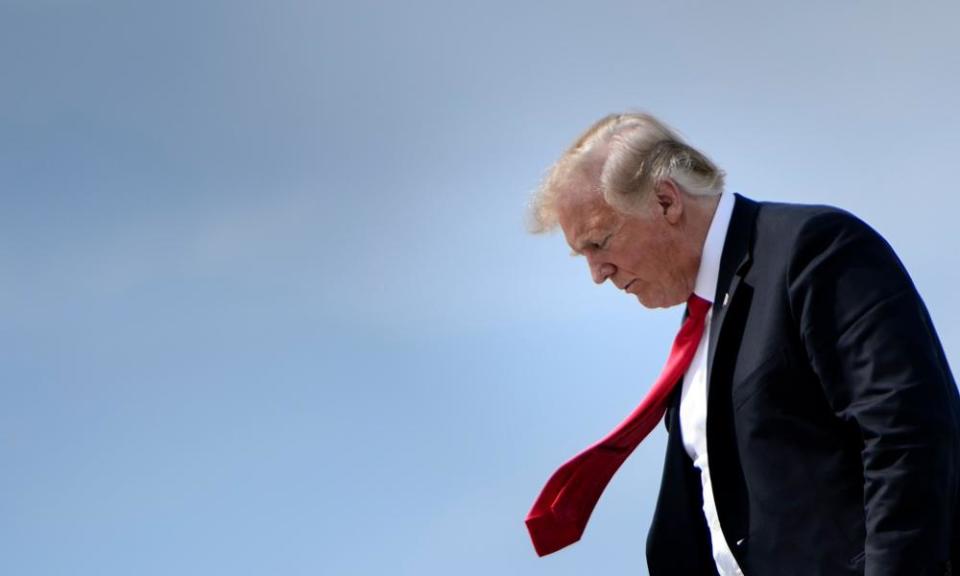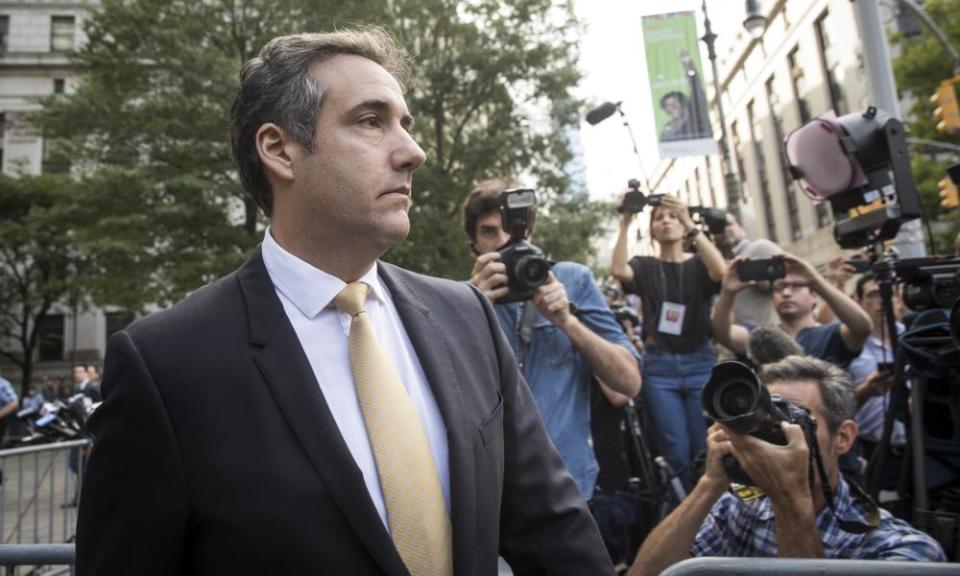Trump's terrible week: stunning news and whispers of impeachment
At around 4.30pm, in courtrooms 200 miles apart, a pair of Trump associates delivered a one-two punch – and that was just Tuesday

Donald Trump’s presidency, it has been widely observed, bends the laws of time. Scandals that would have dogged other presidents for years tend to be here today, gone tomorrow. Fifteen minutes of fame is now likely to count for no more than 15 seconds.
But even by the standards of the Trump universe, this week has been a blur. And at its heart was a single, devastating hour on Tuesday 21 August that effectively turned the president of the United States into an unindicted co-conspirator in a federal crime.
But first, there was Rudy Giuliani. Trump’s lawyer, the former New York mayor, set the tone last Sunday with an Orwellian comment on the NBC network’s Meet the Press. Asked whether the president would give his version of events in testimony to Robert Mueller, the special counsel who is investigating Russian interference in the 2016 presidential election, Giuliani warned of a perjury trap and said: “Truth isn’t truth.”
Interviewer Chuck Todd put his hand on his forehead and said: “This is going to become a bad meme!” And it did.
At the White House on Monday, Trump hosted an event to highlight success stories of the Immigration and Customs Enforcement agency. He said that a border patrol agent, who is Latino, “speaks perfect English” as he beckoned him to the stage. He also misstated the acronym for US Customs and Border Protection at least eight times, referring to it as “CBC”, as in Canadian Broadcasting Corporation.
So far, so Trumpian – fairly typical of this extraordinary presidency. But then came, to use primary election parlance, Super Tuesday. At around 4.30pm, in courtrooms 200 miles apart, a pair of Trump associates delivered a one-two punch that stunned the White House and revived whispers of impeachment.
In New York, Trump’s longtime lawyer and “fixer” Michael Cohen implicated the president in a crime to influence the 2016 presidential election. Pleading guilty to dodging taxes and campaign finance violations, he alleged that Trump directed him to pay hush money to prevent two women – a Playboy model and pornographic actor – speaking out about extramarital affairs.
In Alexandria, Virginia, Paul Manafort, Trump’s former campaign chairman, was found guilty of eight tax and bank fraud charges and could now spend the rest of his life behind bars – unless Trump chooses to pardon him.
Fittingly for the reality TV presidency, the courtroom dramas unfolded just minutes apart, and continued cable news channels’ love-hate relationship with the president. At 4.48pm, CNN host Jake Tapper told viewers: “I apologise. We have more breaking news. It’s like a Saturday Night Live skit.”
“No day during President Trump’s 19 months in office could prove as dangerous or debilitating as Tuesday,” wrote Dan Balz in the Washington Post. “Everything that happened in a pair of courtrooms hundreds of miles apart strengthened the hand of special counsel Robert S Mueller III and weakened that of the president of the United States.”
Cohen’s plea bargain statement could be exhibit A if Democrats win the House of Representatives in November and launch a campaign to impeach the president, though the party continues to play down such talk. And Cohen’s lawyer embarked on a media tour saying his client was eager to sing like a canary for Mueller.
But the day from hell was far from done. The Republican congressman Duncan Hunter and his wife were indicted on corruption charges, namely converting more than $250,000 in campaign money to pay for personal expenses, including dental work, fast food, golf outings and holidays and trips for their family and nearly a dozen relatives.
In 2016, Hunter was the second member of Congress to endorse Trump for president. Earlier this month the first, Chris Collins of New York was indicted for insider trading. The third? Jeff Sessions, now Trump’s out-of-favour attorney general.
Set against all this, Trump would not have been pleased to find his latest campaign rally something of an anticlimax. Somewhat subdued in Charleston, West Virginia, he made no mention of Cohen, Manafort or Hunter, but he did taunt the media: “Where is the collusion? You know they’re still looking for collusion. Where is the collusion? Find some collusion. We want to find the collusion.”
And with irony clearly dead, Trump’s supporters chanted “Lock her up!” – an old refrain about his 2016 opponent Hillary Clinton.
By 8.53pm, the TV news veteran Dan Rather, who has seen it all, was tweeting: “I’ve been saying ‘Wow’ since about 4 o’clock this afternoon, and have yet to stop.”
And then, in one more dose of humiliation, the candidate Trump endorsed for governor of Wyoming, Foster Friess, lost the Republican primary to the state treasurer, Mark Gordon.
The day was a vivid illustration of a news cycle operating at hyperspeed. Bob Shrum, a political science professor at the University of Southern California, drew comparisons with Watergate – particularly the “Saturday Night Massacre”, when Richard Nixon fired the special prosecutor and accepted the resignations of the attorney general and his deputy – and the terrorist attacks in New York and Washington on 11 September 2001.
Shrum added: “But we now just go from one stunning story to another. Instead of Alpha to Omega, it’s Cohen to Omarosa,” – a reference to the reality TV star turned White House aide whose gossipy memoir already feels like an aeon ago.
Then there was Wednesday. At 8.44am, Trump tweeted: “If anyone is looking for a good lawyer, I would strongly suggest that you don’t retain the services of Michael Cohen!” He described Manafort as “a brave man” who took the rap and suggested that the fact 10 of his charges were undecided was proof of a “witch hunt”.

Later, the president gave an interview to Fox News which, as always, had sought to play down the firestorm. He denied instructing to Cohen to commit a crime. “They weren’t taken out of campaign finance, that’s the big thing,” Trump said. “That’s a much bigger thing. Did they come out of the campaign? They didn’t come from the campaign. They came from me.”
He also claimed that he did not find out about the payments until “later”, contradicting earlier statements. For the first time, the Washington Post’s factchecker said the president was lying rather than merely misleading or false. “The president’s statement was a lie – and the people speaking for him repeated it,” the Post commented.
Even Trump, the irrepressible force of nature who fights every crisis by punching back harder, “seemed subdued”, the New York Times reported. “He appeared to realize the serious nature of what had just taken place, and yet his relative calm – contrasted with his more typical lashing out when he is anxious – unnerved some of his aides.”
Not for the first time, perhaps seeking affirmation, on Wednesday night he turned to Fox News. There he saw a spurious Tucker Carlson report pushing a white nationalist conspiracy theory that white farmers in South Africa are being persecuted and murdered in Zimbabwe-style land grabs. Trump tweeted his outrage and promised to consult the state department, whose own human rights report on South Africa had made no mention of the issue.
It was one more white grievance dog whistle to add to all the rest. The South African government issued a swift rebuke and summoned US officials. Patrick Gaspard, the former US ambassador to South Africa, described the intervention as “astounding and deeply disturbing”. He said: “I can draw a line from the irresponsible statements he made in the wake of the violence in Charlottesville and him lifting up tropes from white nationalists in South Africa.”
On Thursday there was no let-up. It emerged that David Pecker, chairman of American Media Inc, which owns the pro-Trump National Enquirer, had been granted immunity to provide information about Cohen and Trump’s involvement with payments to the two women who allege sexual affairs. The Associated Press added fuel to the fire by reporting that the Enquirer kept such secrets locked in a safe, lending it extraordinary power.
That night, the New York Times reported that the Manhattan district attorney’s office was considering pursuing criminal charges against the Trump Organization and two senior company officials in connection with one of the hush money payments.
Meanwhile Trump traded verbal blows with Sessions, whom he said he had only appointed because of his campaign support. On Friday morning he kept going with tweets, urging the attorney general to investigate Hillary Clinton and Democrats in the interests of balance. “Come on Jeff, you can do it, the country is waiting!” Speculation that Sessions will be fired intensified – again, a public feud that in any other era would have dominated headlines.
But instead attention turned back to Trump’s legal crisis as the Wall Street Journal reported that Allen Weisselberg, his longtime financial gatekeeper, was granted immunity by federal prosecutors for providing information about Cohen. There was an ominous sense that the walls are finally closing in on the president.
But as ever during Trump’s wild weeks, there were things being missed or not receiving sufficient information. Buried under the news avalanche: the White House released a greenhouse gas emissions plan that could boost output from coal-fired power plants rather than push them towards closure. Trump’s supreme court nominee, Brett Kavanaugh, moved closer to confirmation as he appeared to get the nod of approval from the Republican senator Susan Collins.
Richard Haas, president of the Council on Foreign Relations, tweeted: “i understand the focus on politics here at home, but 1) NK is not denuclearizing; 2) Venezuela is on the precipice; 3) a crisis with/over Iran is brewing; 4) climate change is worse sooner than predicted; 5) US relations w China and Russia are at post-Cold War nadir. just sayin’”.
The worst week yet of the Trump presidency? It faces stiff competition from his responses to white supremacist violence in Charlottesville, a devastating hurricane in Puerto Rico and the Russian president, Vladimir Putin, in Helsinki. Indeed, with this man in the White House, every week feels like a lifetime.

